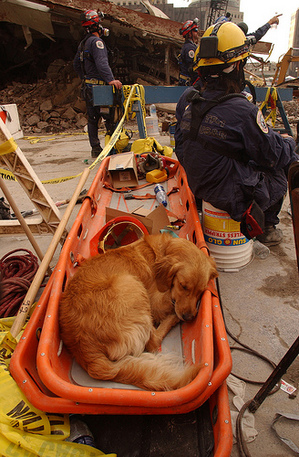Since the events of September 11, the unique role of Search and Rescue dog teams has come to the forefront

A SAR dog taking a much-need nap between search shifts at the World Trade Center site on September 21, 2001.
flickr photo by Beverly and Pack
The events of September 11, 2001 were a display of human behavior at its worst and affected each and every one of us profoundly.
In contrast, it brought out the best when it came to the human race as well.
The urgent the needs of so many people didn't go unattended, by any means. In fact, the areas that were geographically affected in the days following the attacks were flooded with very special individuals: passionately willing and apt, driven by their instincts and their specialized training to do what many of us couldn't even imagine — go into the center of the chaos and save people.
It was difficult, tedious work — sifting through the rubble to search for survivors as well as remains — and the rescue workers that you might envision weren't the only ones behind the scenes.
Search and rescue (SAR) dogs, led by their handlers, were integral in locating those buried a heavy tangle of concrete, steel and glass — not to mention the toxic chemicals. Because of the treacherous terrain that had been newly formed, it was difficult to navigate through, and, in finding survivors, time was of the essence.
Their unique scenting abilities make these canines prized in these types of situations, and in the case of the World Trade Center and Pentagon sites, SAR dogs expedited the process, working in tandem with their handlers and rescue workers around the clock to find survivors as well as human remains.
Nona Kilgore Bauer's book, "Dog Heroes of September 11th: A Tribute to America's Search and Rescue Dogs," highlights the experiences of SAR dog teams and offers a stark, poignant look at the days and weeks following the events that happened 11 years ago today.
"Without the SAR dogs, thousands of families would have not had the closure that comes with finding their loved ones and friends. That contribution is priceless, and Americans needed to know that," says Bauer.
Bauer says that since that day in 2001, the idea that SAR dogs play an important role in expediting disaster searches has become a priority.
"9/11 really increased the awareness of importance of a dog's role in disaster search and the need for more highly trained SAR dogs. Training has expanded in order to prepare for any future disasters, here and abroad, but the United States still needs many more SAR teams. The Search Dog Foundation is dedicated to providing those teams and working toward that goal."
Retired schoolteacher Wilma Melville, who was already a seasoned partner on a SAR team, started Search Dog Foundation in 1995.
Interestingly enough, the background of some SAR dogs currently in service across the country just might surprise you: The majority of canines who are trained through SDF have come from rescues and shelters.
Lorrie Shaw leads the pets section for AnnArbor.com. Connect with her on Google + or e-mail her directly.


Comments
jns131
Thu, Sep 13, 2012 : 1:52 p.m.
But with funding cuts? These animals are the first to go in budget constraints. Totally sad when it comes to having to get a dog in an emergency situation and the only dog available is less then 50 or so miles away. There is one community that did get cut in Washtenaw County and remember Pittsfield? They had to wait on one. Yes, these are valuable animals and we should put cost as a factor when saving a life.
HONDO
Tue, Sep 18, 2012 : 11:45 a.m.
Most SAR dogs and handlers are civillians. They train and respond on their time and $$. So dont blame budget cuts. Drug and bomb dogs cost in upwards of $10k. Point being, SAR trained dogs are more available than people think. Legalities get in the way of them being utilized more. Not jabbing you.
LA
Wed, Sep 12, 2012 : 2:42 p.m.
Love the fact that so many are from shelters and rescues!!!
green1
Wed, Sep 12, 2012 : 12:38 a.m.
AAPD Officer Mark Brayton and his K9, Cliff, were there.